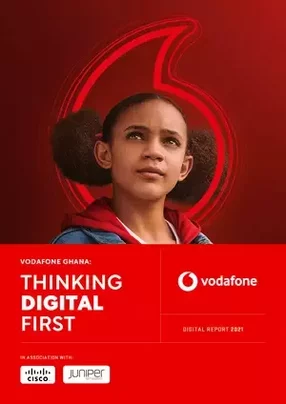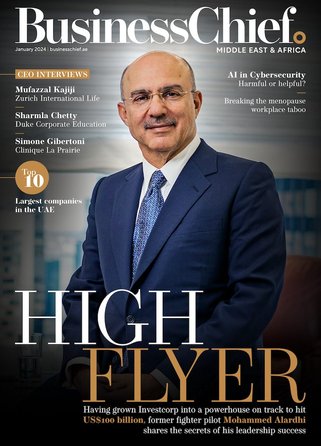At the heart of every modern mobile network operator is a sizable IT stack. At Vodafone Ghana, which has a subscriber base of more than 9mn people, the job of managing and overseeing that IT stack falls to Moses Okundi, the company’s Chief Information Officer.
An Unprecedented Year
Okundi joined Vodafone Ghana in late 2019, and quickly found himself faced with the unexpected and unprecedented challenge of the COVID-19 crisis. Now, a year later, Vodafone Ghana and Okundi can look back on the first year of the pandemic with a sense of pride, not only in their response to the changing demands brought about by the crisis, but also in the scale and efficacy of the digital transformation that is underway at the company, and what it has achieved so far.
“As I’m sure you can imagine, the demand placed on us as an IT organisation in response to COVID-19 was enormous,” says Okundi. “We had to very quickly set the entire workforce up to work remotely, and support our partners to do the same. The bulk of our workforce is our call centre team, who typically come into the office. We had to figure out how to maintain this workforce so they could attend to customers because, in parallel, those customers were also adopting digital ways of interacting, transacting and engaging with one another in response to the pandemic.”
The COVID-19 pandemic drove a huge spike in demand, both for customer support services, and Vodafone Ghana’s digital channels, which needed to adapt - and adapt fast.
“We had to expand our capacity across our digital channels to accommodate growth in traffic from increased consumption of our digital services, increase the number of channels for payments through our digital app, and increase and integrate digital customer engagement channels, including social media. At the same time, we set up our entire workforce to be able to work securely, conveniently and comfortably from home,” Okundi reflects, before taking a very deep breath.
“We rallied the team, put a plan into motion, and executed it well. I'm quite proud of us for pulling it off.”
If Okundi had anything to say about it, COVID-19 would get the award for digital accelerator of the year, given the way the pandemic has forced the whole world to embrace digital transformation at never-before-seen speeds, and “jump feet first into new, digitally-driven ways of doing business.”
The Heart of Vodafone Ghana
Outside of the organisation’s radio access network (RAN) and network core, everything technological within the scope of Vodafone Ghana is Okundi’s job to look after, from the enterprise IT stack, business support systems (BSS), charging, billing and subscription solutions, to the multiple digital channels through which end-customers interact with Vodafone Ghana, including everything from SMS to web pages and the company’s suite of apps.
Okundi sees his role as that of an enabler and facilitator. “All of these digital elements of the business end up consuming services from the legacy telco systems. We have to somehow link all those systems together, efficiently leveraging our own middleware platforms, APIs & Microservices that we’ve developed in-house,” he explains. “My team and I need to enable our frontline employees and agents - those in the field, shops and call centres, interacting with our customers in real-time around the clock - to be able to do their jobs on a day-to-day basis in a seamless manner. That means connectivity, and a platform that can interface with the rest of the company's systems, which provide everything from order and relationship management to analytics and reporting, service fulfilment such as subscription and resource purchase enablement, additionally unlocking efficiencies through process automation.”
Uniting a burgeoning tech stack with a national-scale telecom operator’s legacy system is no mean feat. Transforming Vodafone Ghana’s legacy systems into cloud-ready functions that integrate seamlessly with the rest of the company’s digital capabilities, all while improving the experience for the end-user, is the focus of Okundi’s digital transformation efforts.
When approaching this mammoth task, Okundi says that it’s essential to understand one’s priorities and goals. “We need to identify what success looks like for us,” he says. “First of all, we want our customers to have a near-seamless experience when consuming our services. That’s why we are working on enhancing that customer experience across all our digital channels and enabling our customers to fulfil all their needs through those digital channels.”
With that core principle in mind, the next step takes place within Vodafone Ghana itself, in the heart of Okundi’s own domain: the IT department. “It's important to remember that the channel itself is just one piece of the puzzle. There's also a significant digital transformation that we need to do behind the scenes,” he says, adding that Vodafone Ghana is investing heavily in a virtual environment, a DevSecOps toolset enabling Continuous Integration & Continuous Deployment (CI/CD), and driving the need for people development in the digital skills “that can facilitate the kind of sustained quick turnaround we need.”
A key step here is to rapidly increase microservices, which means, “that for any service we need to deliver, our developers don't have to spend a long time writing new code, but rather consume from existing microservices, which really speeds up the process.”
Okundi is also driving the initiative to transform applications to be cloud-ready. Key applications are already cloud-ready. “We have made good progress to virtualise the IT environment. We are about halfway done now,” he explains. “All our upcoming transformation initiatives will also require as a minimum that concerned applications are cloud-ready, and support Open APIs and microservices.”
Squads and Tribes
“As a modern telco, you need to be fast. You need to continue to deliver value in an agile manner, realising value in iterations, as opposed to a more traditional waterfall approach,” explains Okundi. “You need to create that value quickly and deliver it at pace.”
Squads and tribes are an increasingly popular feature of an agile organisation, which give individual groups full responsibility for a product or service from end-to-end, rather than passing that product around to different departments throughout its development cycle.
“There's an enormous cultural change that we need to drive and execute as part of our digital transformation, and a learning curve that we need to climb,” Okundi adds. “This is one of the areas where I really appreciate being part of Vodafone & Vodacom Groups. There's a myriad of resources and support that is offered, including strategy, architecture, course material etc. to help us climb that curve.” One example is the #OneMoreSkill initiative, which encourages Vodafone employees to get new certifications and training in areas including cloud, analytics, Artificial Intelligence, and Agile.
Bringing it All Together
In order to unify all the elements of Vodafone Ghana’s IT stack, Okundi reveals that, “we're putting it all together using an integration layer that cuts across our whole stack to ensure that every element talks to one another in a near-seamless manner.” The process is going well, with the integration layer now capable of facilitating payments, resource consumption and subscriptions, to name a few of its capabilities.
Due to the expense involved in buying an off-the-shelf integration layer solution, Okundi’s team built their own, something he’s immensely proud of them for doing.
“The team has really done a great job to create and enhance that layer, and to really create a roadmap for what has now become a critical core element of our IT architecture. I would like to applaud them for rising to the occasion and finding a way forward without us having to expend a huge amount of money buying an off-the-shelf solution,” he says. “In this digital world, it's critical to develop those internal capabilities and strategies. Doing so obviously reduces cost, but it also gives you more agility and speed of delivery going forward.”
Looking forward to 2021 and beyond, Okundi is excited and optimistic, but acknowledges that there’s still a lot to be done. “This year, we're pushing forward with our key transformation,” he explains. “To transform our BSS, we're engaging with our partners to establish a cloud-ready, modular, omnichannel, capable of making upgrades without downtime, and can leverage open APIs and microservices. Having a strong partner ecosystem is critical. Your partners help you to accelerate your agenda in ways you can't achieve alone.”
Additionally, he notes that he and his team will have to continue with the data centre modernisation and basic housekeeping in the Vodafone Ghana data centres in readiness for company-wide cloud adoption.
And lastly, he emphasises that the coming year will be one of personal development, as well as supporting others to grow and develop themselves. He concludes: “I want to keep pushing this culture of learning and growth, focus on gaining new digital skills, thinking digital-first, and supporting the kinds of personal transformations that allow people to have fun, engage and develop alongside this rapidly accelerating digital world in which we all live.”




